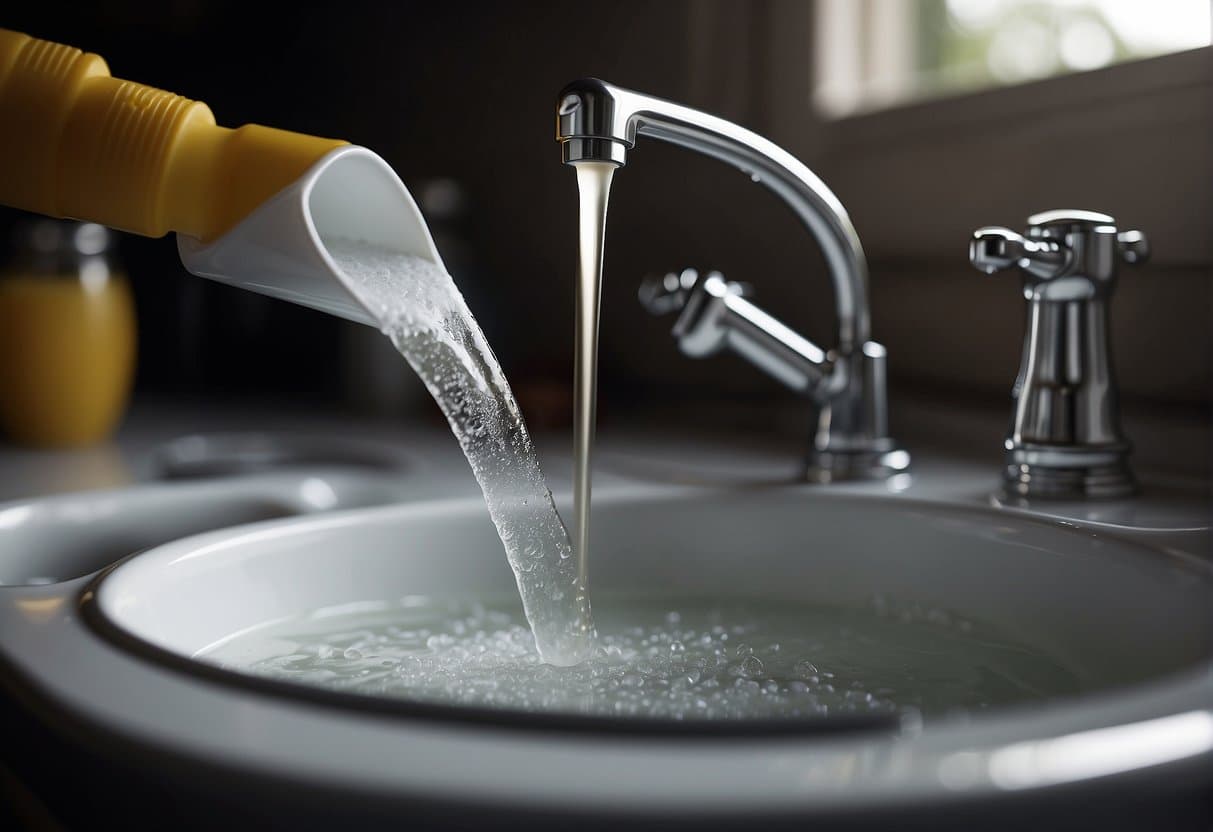Need a plumber? Plumbing issues can be a real headache for homeowners and businesses alike. From clogged drains to leaky pipes, these problems often require the expert knowledge and skills of a professional plumber. With an array of plumbing services available, it’s important to know when and why one might need to call in the experts.
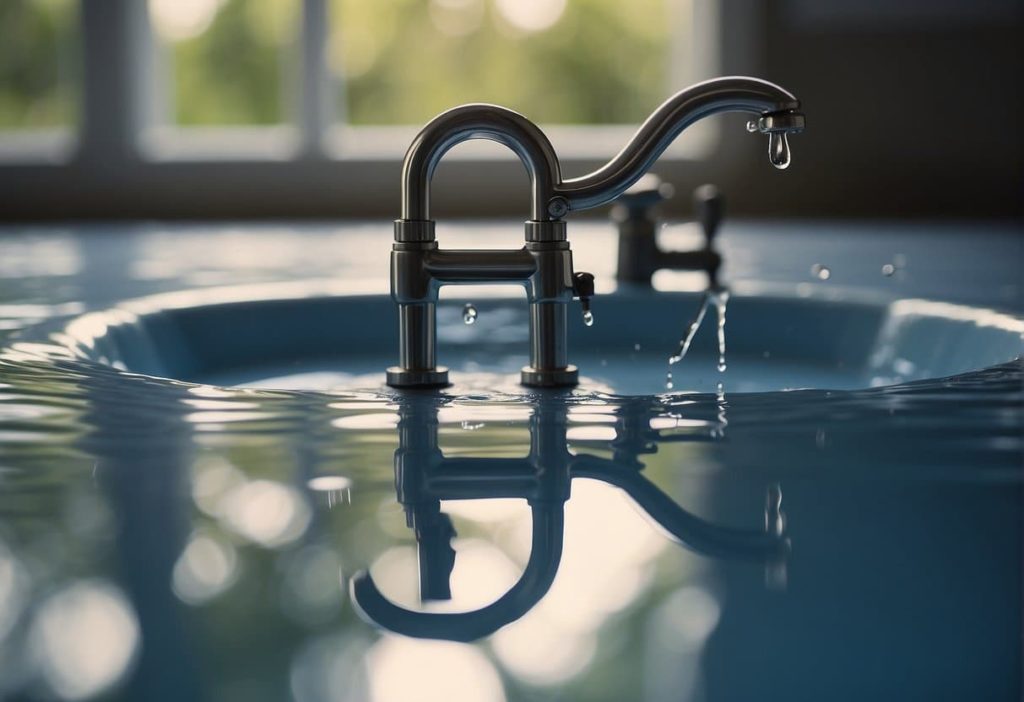
Plumbers are well-equipped to handle a variety of plumbing concerns, offering both repair and installation services. These professionals have undergone extensive training, allowing them to efficiently diagnose and resolve common complications such as blockages, water pressure issues, and faulty fixtures. Additionally, plumbers are knowledgeable in local plumbing codes, ensuring that their work adheres to safety regulations and guidelines.
Not only do plumbing services address immediate concerns, but they can also provide preventative maintenance to minimize the potential for future issues. Regular inspections and timely servicing of plumbing systems help maintain their optimal function and prevent costly damages. Ultimately, knowing when to call in a professional plumber is essential in maintaining a property’s plumbing system and avoiding further complications.
Why Hiring a Professional Plumber is Crucial
Reputation and Trust
Hiring a professional plumber is essential to ensure trust and a good reputation. Professional plumbers have years of experience and expertise, allowing them to diagnose and fix plumbing problems with precision. By working with established professionals, you can expect a high level of competence and minimal mistakes. This ensures that the work done on your plumbing system is of the highest quality, which in turn can prevent future problems and save you money in the long run.
Licensing and Insurance
Another important aspect of hiring a professional plumber is their licensing and insurance. Licensed plumbers have undergone rigorous training and passed examinations to prove their proficiency in the plumbing trade. This guarantees that they are knowledgeable in industry standards and best practices when it comes to handling all types of plumbing issues.
Moreover, insured plumbers possess liability insurance, which protects you as a homeowner in case of any damages or accidents occurring during the plumbing work. This adds an extra layer of security and peace of mind, knowing that your property is safeguarded from potential risks.
It’s also important to have insurance in place, just in case the worst happens. For example, renters insurance might cover water damage, meaning that, should your stuff be damaged due to a plumbing incident, you’ll be protected.
Guaranteed Quality of Work
The most compelling reason to hire a professional plumber is the guaranteed quality of work. A reputable, licensed, and insured plumber will stand behind their work, offering warranties or guarantees on their services. This ensures that if any issues arise after the job is completed, they will return to fix them without charging you extra.
By hiring a professional plumber, you can expect:
- Professionalism: Proper communication, punctuality, and clean workspaces
- Quality: High-quality materials and meticulous attention to detail
- Trust: Confidence in their abilities to get the job done right the first time
In summary, hiring a professional plumber is crucial for protecting your home and ensuring top-quality plumbing work. A skilled, licensed, and insured plumber offers reputation and trust, essential licensing and insurance, and guarantees the quality of work performed. Choosing a professional plumber will undoubtedly safeguard your home and deliver lasting results.
Understanding Common Plumbing Issues
Gurgling pipes, low water pressure, or a weird smell emanating from the drain? It can be hard to know when it’s important to call a plumber ASAP and when things aren’t so urgent. While it may be tempting to DIY a plumbing problem, in virtually all cases it’s not advisable: as well as compromising your own safety, trying to deal with something like a burst pipe yourself could end up causing more damage.
Below, you’ll find some of the most common scenarios in which you should contact a plumber for assistance immediately and what you can expect them to do to resolve the situation.
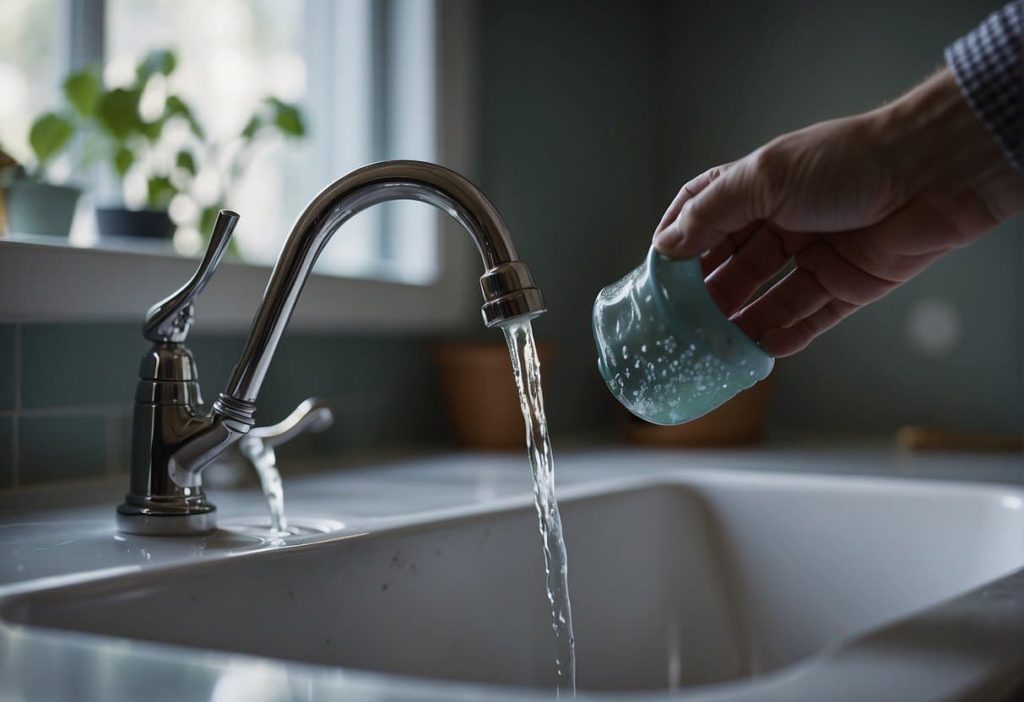
Burst Pipe Situation
A burst pipe is a nightmare scenario, often resulting in a gush of water flooding into your home from the pipe in question. This is definitely a scenario in which you need to call a plumber immediately. The first action to take is to find the shut-off valve and turn off the water. While you’re waiting for the plumber to arrive, you should remove your stuff from the affected area to prevent damage.
Once your emergency plumber arrives, they’ll assess the situation, identify the burst section of pipe, and undertake a replacement or repair – and then it’s just a case of cleaning up. Burst pipes can be caused by freezing, corrosion, or simple wear and tear.
Frozen Pipes
And talking about frozen pipes, if you suspect this has happened, it’s also time to call a plumber. While it might be tempting to have a go at sorting frozen pipes out yourself, it’s easy to cause further damage. As well as causing a burst, frozen pipes can also result in reduced water flow, bulging pipes, or smelly drains, so if you notice any of these things during a spell of cold weather, get a plumber in to check out the situation as soon as possible.
Once they arrive, the plumber will deploy safe techniques to thaw the affected pipe while avoiding a rupture and can also add some effective insulation to prevent the problem from arising again in the future.
Sewage Backup Scenario
A sewage backup scenario is on a level – or maybe even worse – than a burst pipe occurrence. Watch out for the red flags: backups in the toilet, gurgling sounds from the drains, or nasty smells wafting from plumbing fixtures all indicate trouble brewing. Literally. Call a plumber right away.
Sewage backups can constitute a real risk to health and safety, so it’s important to evacuate the area immediately. Once your plumber arrives, they’ll use tools such as sewer cameras to find out what’s going on and then deal with any blockages or damage to the sewer line.
Discolored Water Disaster
You turn on the faucet, and instead of sparkling clear water, you get a rush of brownish liquid – eeugh! Discolored water is usually due to pipe corrosion, deterioration, or the presence of sediment. Whatever it is, you need a visit from a plumber ASAP to ensure the return of a clean, safe water supply.
A plumber will be able to flush the system to remove any sediment present, identify the cause of the discoloration, and take steps to resolve it.
Drop in Water Pressure
Water pressure should be fairly constant in your home, so if it suddenly drops, it’s often a sign of a problem. This could be a leak somewhere in the system, a broken pressure regulator or mineral buildup.
While this may seem like a minor thing that can be ignored, low water pressure can cause your water bills to spike significantly. Plus, if the drop is the result of a damaged pipe in the walls or beneath your home’s foundation, it can cause severe issues and a major expense to put right. Get a plumber in to diagnose the cause of the problem and get it fixed.
Leaks and Drips
Leaks and drips are common plumbing issues that can cause considerable damage if not addressed promptly. They may appear in various parts of the plumbing system, such as faucets, pipes, and toilets. Some common causes of leaks include:
- Corroded pipes
- Worn-out washers
- Loose connections
To identify the source of a leak, it’s essential to check for visible signs of moisture or water damage around fittings and fixtures. In some cases, a professional plumber may need to perform a more thorough inspection to determine the exact location and cause of the leak.
Clogged Drains and Toilets
Another common plumbing issue is clogged drains. These can result in slow draining, unpleasant odors, and even flooding if not properly addressed. Some reasons for clogged drains include:
- Hair buildup
- Grease and food particles
- Foreign objects
With toilets, clogs can be particularly inconvenient and may even result in a plumbing emergency. To avoid clogged toilets, it’s essential to:
- Regularly clean the toilet bowl and drain
- Avoid flushing items other than toilet paper
- Keep a plunger nearby to address minor clogs
For severe drain clogs, professional drain cleaning may be necessary to restore proper water flow.
Water Heater Concerns
Water heaters play a critical role in delivering hot water throughout your home, so it’s important to address any concerns as soon as they arise. Some common issues with water heaters include:
| Issue | Possible Causes |
| Insufficient hot water | – Sediment buildup- Faulty heating elements- Incorrect thermostat settings |
| Leaks | – Corroded tank- Loose connections- Damaged pressure relief valve |
If your water heater is showing signs of aging or inefficiency, it might need repairs or replacement. A professional plumber can evaluate the situation and recommend the most appropriate course of action. Regular maintenance can also prevent water heater concerns, extending the lifespan and efficiency of the appliance.
Comprehensive Plumbing Services Offered
Routine Check-ups and Maintenance
Regular plumbing services are essential to maintain the proper functioning of your building’s plumbing system. These include:
- Regular inspections to monitor the overall condition of the system
- Diagnostics using advanced equipment to detect potential issues
- Maintenance tasks, such as cleaning drain lines, adjusting the water pressure, and replacing worn-out parts
These services help to prevent serious plumbing issues, extend the lifespan of the plumbing system, and ultimately save costs on extensive repairs in the long run.
Advanced Diagnostics and Solutions
For plumbing systems that might have more complex issues, advanced diagnostics using state-of-the-art equipment can help. Some of these innovative solutions include:
- Leak detection: Utilizing electronic devices to accurately pinpoint the location of hidden leaks
- Video inspection: Inserting a small camera into pipes to visually inspect their interior and identify blockages, cracks, and other issues
- Hydro jetting: Multipurpose cleaning technique that employs high-pressure water jets to remove accumulated debris in drain lines
When a problem is discovered through these advanced diagnostics, plumbing professionals can rapidly identify the best course of action and implement the necessary plumbing repairs.
Emergency Plumbing Repair Services
Unfortunately, plumbing emergencies can occur any time, day or night. Comprehensive plumbing service providers offer emergency plumbing repair services available 24 hours a day, 365 days a year, extending to nights, weekends, and holidays. Some common emergencies include:
- Burst pipes
- Sewage backups
- Overflowing toilets
- Gas leaks
- Blocked drains
When engaging their emergency service, residents and business owners can have peace of mind knowing that a skilled plumbing team is ready to respond quickly and efficiently, helping minimize damage to the property and restore normal operations as soon as possible.
The Process of a Plumbing Project
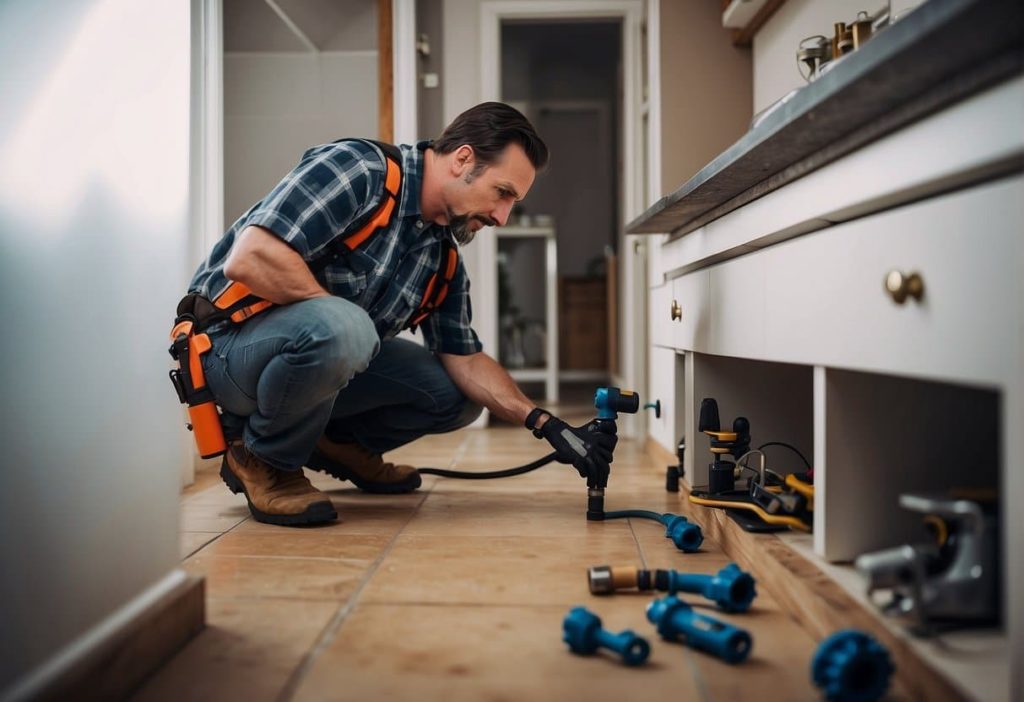
Initial Inspection and Estimates
During the initial stage of a plumbing project, a professional plumber conducts an inspection to assess the issue. This assessment is important to properly identify the problem and the required repairs or installations. Depending on the scope of work, the initial inspection may include checking for water heater issues, sewer line problems, and other common plumbing concerns.
After the inspection, a detailed estimate is provided. This includes the cost of labor, materials, and any additional services needed. Many plumbing companies offer free estimates to customers, which helps homeowners better plan their home project budget.
Plumbing Repairs and Installations
Once the estimate is approved, the plumbing repairs and installations can begin. Typical plumbing services include:
- Water heater repair and installations: Ensuring that the water heater is functioning efficiently and safely, or replacing an old or damaged unit with a new one.
- Sewer line repair: Addressing issues with the sewer line such as leaks, blockages, or tree root intrusion.
- General repairs: Fixing any other plumbing problems found throughout the home, such as leaking faucets or damaged pipes.
Plumbing professionals take care of every aspect of the repair or installation process, from procuring necessary materials, assembling required tools, and performing the work to a high standard.
Post-Service Follow-Up
After the plumbing service is completed, a post-service follow-up is conducted to ensure customer satisfaction. This may involve a phone call, email, or even an in-person visit, depending on the company and specific service provided.
During this follow-up, the plumbing company checks that the repairs or installations have been completed to the homeowner’s satisfaction and that there are no lingering problems. This displays a commitment to excellent customer service and provides homeowners with peace of mind, knowing the plumbing issue has been resolved by a knowledgeable and reliable professional.
Choosing the Right Plumber for Your Home
To maintain the quality of your home’s plumbing system, homeowners need to choose a trusted plumbing contractor. In this section, we’ll discuss the key factors to consider when selecting a plumber, including evaluating their experience and expertise, checking reviews and references, and comparing cost estimates.
Evaluating Experience and Expertise
When searching for a plumbing contractor, it’s essential to assess their experience and expertise in the field. A skilled plumber should be well-versed in various plumbing issues and be able to offer comprehensive solutions. Here are some aspects to consider:
- Years in business: Ideally, look for a plumber who has been in the industry for a significant amount of time. This usually indicates a higher level of expertise and stability.
- Training and certifications: A reputable plumbing contractor should have undergone proper training and possess valid certifications as proof of their competence in the field.
- Specializations: Determine if the plumber is experienced in handling the specific type of problem you’re facing, such as installation, repair, or maintenance.
Checking Reviews and References
Customer reviews play a crucial role in understanding the reputation of a plumbing contractor. Here’s how to make use of them:
- Online platforms: Check popular review websites like Yelp, Google, and Angie’s List to read testimonials from previous customers.
- Social media: Look for the plumber’s social media profiles and peruse the comments to gather more information on their services.
- Friends and family: Ask for recommendations from trusted acquaintances who have previously hired local pros for their plumbing needs.
Moreover, don’t hesitate to request references from the plumber themselves. Contacting their past clients directly can provide valuable insights into the quality of their work.
Comparing Cost Estimates
It’s important to receive and compare cost estimates from multiple plumbing contractors before making your decision. Take the following factors into account:
- Detailed breakdown: A reliable plumber should provide an itemized list of the expenses involved, which includes labor, materials, and any additional fees.
- Transparent pricing: Steer clear of contractors who refuse to provide clear information about their pricing or charge hidden costs.
- Value for money: Assess if the plumber’s services align with your budget and offer a fair balance between quality and cost.
By considering these factors, homeowners can confidently select the right plumber for their needs, ensuring the health and longevity of their home’s plumbing system.
The Role of Technology and Equipment in Plumbing
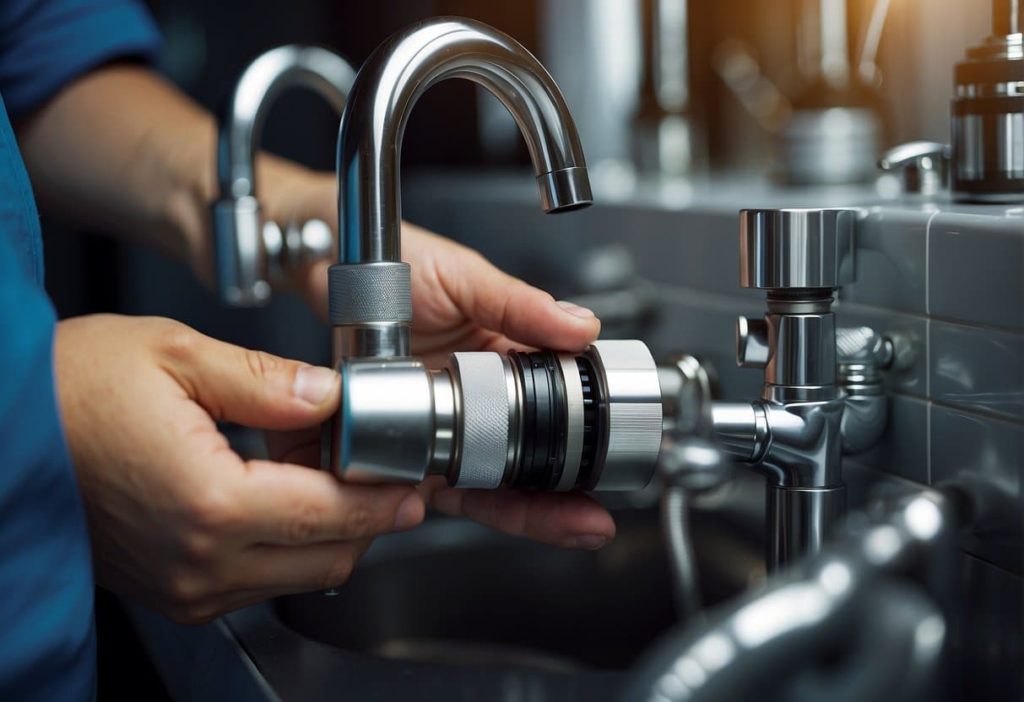
State-of-the-Art Plumbing Equipment
In the plumbing industry, technology and equipment have advanced significantly, leading to greater efficiency and effectiveness in addressing various plumbing issues. The use of state-of-the-art plumbing equipment allows professionals to identify and resolve problems with precision and accuracy. Some examples of this advanced equipment include:
- High-resolution cameras: These are used to inspect pipes and detect any blockages, leaks, or damage without the need for invasive procedures.
- Hydro-jetting machines: These use high-pressure water jets to break down and remove stubborn clogs in pipes.
- Pipe locators: They help technicians to pinpoint the location of underground pipes, preventing unnecessary excavation and reducing damage to the property.
These modern tools enable highly-trained professionals to work more efficiently, saving customers time and money on their plumbing repairs.
Technician Training and Expertise
The adoption of advanced technology and equipment in plumbing requires technicians to undergo specialized training and possess the expertise to utilize these tools effectively. Professionals in the industry strive to stay up-to-date with the latest advancements to provide their clients with the highest level of service.
Training programs, such as vocational schools and apprenticeships, offer courses that focus on using modern plumbing equipment. This ensures that technicians are not only knowledgeable in their field but also proficient in handling today’s advanced technologies.
By equipping themselves with the latest knowledge and tools, highly-trained professionals can offer efficient and reliable solutions to a wide range of plumbing issues. This ultimately leads to better service for customers and a more prosperous industry overall.
Preventative Measures and Long-Term Care
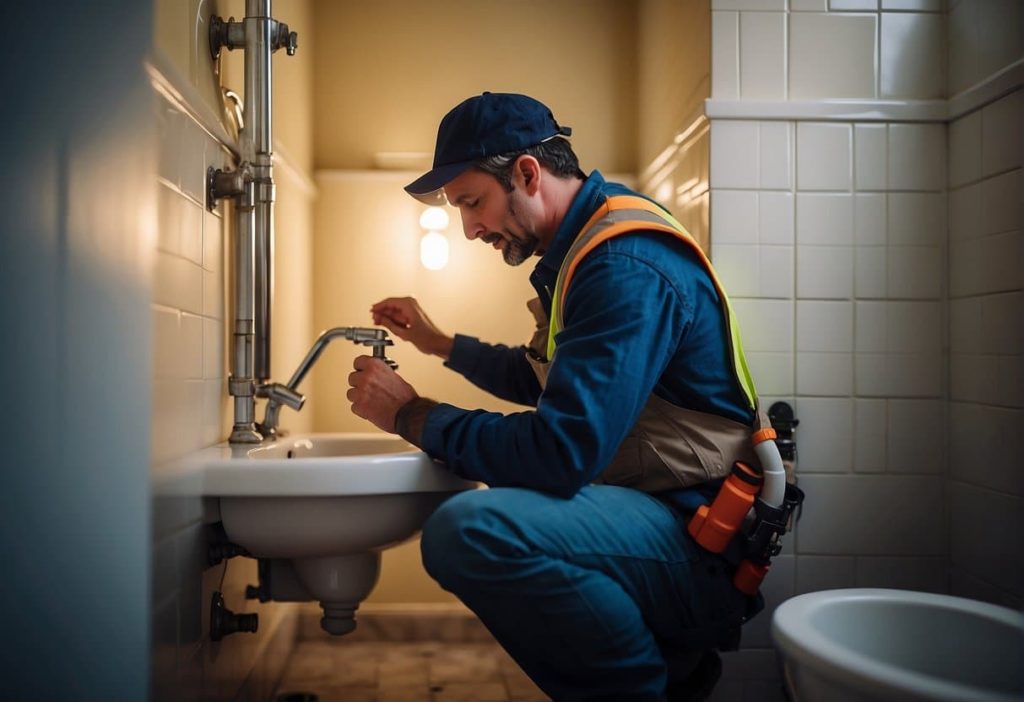
Regular Maintenance Best Practices
Regular maintenance is essential for keeping your plumbing system in good working order. One such practice is to schedule periodic drain services to clear out debris, prevent clogs, and maintain the health of your pipes. Conduct inspections on a regular basis, checking for leaks, corrosion, and other issues that could require attention.
When it comes to hot water systems, routine maintenance should not be overlooked. This includes regularly checking the pressure relief valve, flushing the tank, and inspecting the anode rod.
Consider using the following table as a helpful guide:
| Task | Frequency |
| Drain Service | Every 6-12 months |
| Inspect Pipes | Annually |
| Check Hot Water System | Every 6 months |
Keep in mind that these are general suggestions and each plumbing system might require adjustments based on specific needs.
Recognizing Early Signs of Plumbing Issues
Early detection of plumbing issues is crucial to save both time and money in the long run. Familiarize yourself with the following warning signs:
- Slow draining: If water takes a long time to drain from your sink, shower, or bathtub, it could be an indication of a clog.
- Unpleasant odors: Persistent sewer gas or musty smells coming from your drains might signify a blocked vent or sewer line.
- Discolored water: Rusty or brown-colored water is a clear indication of pipe corrosion or sediment build-up in your hot water tank.
- Mold and mildew: If you notice mold on walls or around plumbing fixtures, it can suggest a hidden leak that requires immediate attention.
Incorporating regular maintenance into your routine and being vigilant in identifying early signs of plumbing issues can prevent significant damage and long-term issues for your home. Remember to consult with a professional plumber for any concerns or questions about your plumbing system.
Beyond Plumbing: Related Home Systems
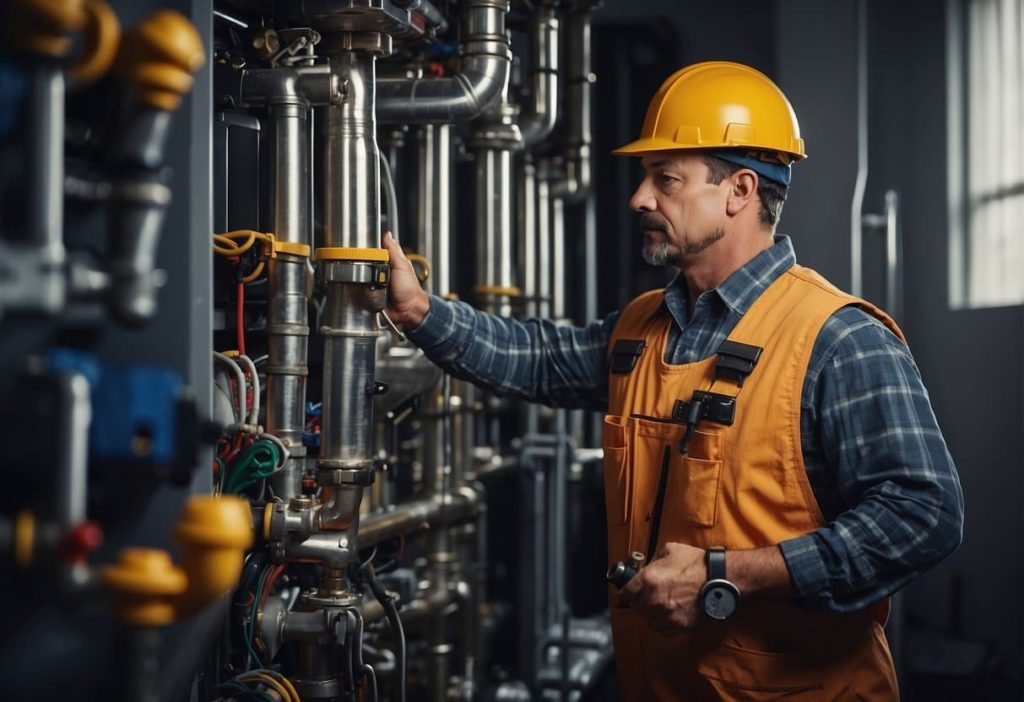
Heating and Air Conditioning Insights
Heating and air conditioning systems are essential components of a comfortable and efficient home. Proper maintenance and timely repairs are crucial to ensure their smooth operation. Familiarizing yourself with common heating and air conditioning issues can help you easily identify potential problems and know when to call in a professional.
- Heating issues: Among the most common heating problems are malfunctioning thermostats, dirty filters, and lack of heat. Regularly changing the filters and scheduling annual maintenance checks can help prevent these issues.
- Air conditioning problems: A common problem with air conditioning systems is reduced airflow, often caused by dirty filters or blocked air ducts. Other issues may include frozen coils, refrigerant leaks, or dysfunctional compressors. Regular maintenance can help prevent these issues and keep your home cool and comfortable.
Water Cleanup and Damage Prevention
In addition to heating and air conditioning systems, another key aspect of maintaining a healthy home environment is preventing and addressing water damage. Prompt water cleanup and damage prevention measures can save you time, money, and stress.
- Water damage: Some common sources of water damage include plumbing leaks, burst pipes, and malfunctioning appliances. It is essential to address water damage as soon as it is discovered to prevent mold growth and structural damage.
- Water cleanup: Efficient water cleanup involves promptly removing excess water, drying out affected areas, and repairing or replacing damaged materials. In case of extensive water damage, it is advisable to seek professional help for a thorough cleanup and restoration.
Remember to regularly inspect your home for any signs of water damage, such as discoloration or a musty odor. This way, you can take immediate action, ensuring your home remains a safe and comfortable sanctuary.
Ensuring Customer Satisfaction
Transparent Communication
Effective customer service begins with transparent communication between the plumber and the client. Top plumbing companies understand the importance of clearly explaining the work process and promptly addressing any client concerns. This includes providing detailed quotes, specifying the required repairs, and estimating the project timeline.
Furthermore, companies should keep clients informed throughout the service, offering regular updates and addressing any potential issues. A professional plumber will share essential information with the customer, such as:
- Types of materials used
- Any permits or inspections required
- Work completion schedules
Transparent communication creates a sense of trust and ensures customer satisfaction, as clients can feel confident that their plumber is reliable and professional.
After-Service Support and Warranty
Exceptional plumbing companies will always demonstrate their commitment to providing excellent service by offering after-service support and warranties. This support should encompass the following components:
- Post-repair inspections: Once the service is complete, a professional plumber should conduct a thorough inspection to ensure that the issue is resolved and there are no additional concerns.
- Customer follow-up: A follow-up call or email after the service completion demonstrates that the company values its clients’ satisfaction and is willing to address any feedback.
- Warranty: Providing warranties on work done and materials used is an indication of the company’s confidence in the quality of their service and can be an essential factor for customer satisfaction. Clients should be informed of warranty details, including duration and limitations.
By focusing on transparent communication and offering after-service support and warranties, plumbing companies can achieve high levels of customer satisfaction, making clients feel confident in their choice of service provider.
Plumbing Safety and Compliance
Adhering to Plumbing Codes
Adhering to plumbing codes is essential for ensuring safety and compliance. These codes are designed to maintain high standards for plumbing systems and protect the health of those who use them. Licensed plumbers are required to acquire plumbing licenses and be well-versed in the latest updates of these codes. This ensures that they have the necessary knowledge and skills to safely and effectively perform their jobs.
Some of the commonly enforced plumbing codes relate to:
- Proper materials usage
- Accurate pipe sizing and placement
- Adequate venting
- Prevention of backflow and cross-connections
- Ensuring proper water pressure
Compliance with these codes not only guarantees safety, but also ensures that plumbing work meets a level of quality and professionalism required in the industry.
Safe Practices During Plumbing Work
Safe practices are a crucial aspect of the plumbing profession. Due to the potential hazards that are associated with plumbing work, it is vital for plumbers to be conscientious about safety. Some noteworthy safety tips for plumbers include:
- Proper equipment usage: Plumbers should always use appropriate tools and equipment for the task at hand. This helps prevent injuries and ensures that their work is effectively executed.
- Personal Protective Equipment (PPE): Wearing appropriate PPE is essential for safeguarding against potential hazards. Some essential PPE for plumbers include safety goggles, gloves, steel-toed boots, and hearing protection when working with loud equipment.
- Electrical safety: Plumbers need to be cautious while working near electrical sources. They should avoid contact with live wires and also use non-conductive tools.
- Trench and excavation safety: When working in trenches or excavations, plumbers should always be aware of the potential risks, such as cave-ins or hazardous gases. Proper shoring and ventilation techniques can help minimize these risks.
By following these safety practices and adhering to plumbing codes, plumbers can ensure compliance and maintain a high standard of professionalism in their work. More importantly, they can minimize risks and ensure the safety and well-being of those they serve.
Additional Services and Specializations
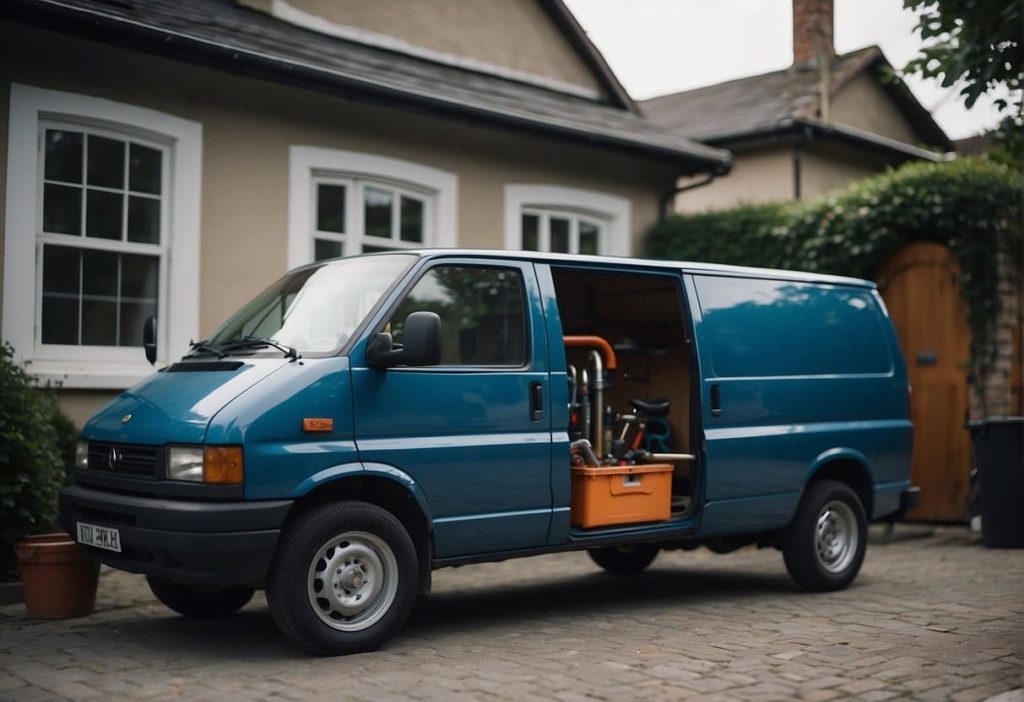
Bathroom and Kitchen Remodeling Services
Professional plumbers also offer bathroom and kitchen remodeling services. These specialized services can include a wide range of tasks, such as:
- Fixture installations: Installing faucets, sinks, toilets, and showers
- Plumbing layout and design: Advising on the best plumbing setup for optimal functionality
- Appliance installation: Connecting dishwashers, garbage disposals, and other kitchen appliances
When working on a remodeling project, it’s essential to partner with a plumber who has experience in both bathroom and kitchen remodeling. This will ensure that the project proceeds smoothly, with any necessary adjustments made in a timely manner.
Advanced Leak Detection and Solutions
Leaks can be a significant issue in both residential and commercial properties. Advanced leak detection techniques used by professional plumbers help to locate the source of the problem quickly and efficiently. Some of these techniques include:
- Video camera inspection: Using a small camera to visually inspect pipes for damage or blockages
- Infrared technology: Employing thermal imaging to detect temperature changes indicative of a leak
- Acoustic listening devices: Utilizing specialized equipment to listen for the sound of water escaping from pipes
Once the source of the leak has been identified, plumbers can offer a range of solutions to address the problem, such as:
- Pipe repair or replacement: Fixing or replacing damaged sections of pipe
- Sealing: Applying sealant to small cracks or leaks in pipes
- Water pressure adjustments: Reducing the water pressure in the system to prevent further leaks
In some cases, a plumber may recommend additional handyman services such as fixing water-damaged walls or replacing damaged flooring. By offering these additional services, professional plumbers can help to ensure that properties are returned to their pre-leak condition as quickly as possible.
Frequently Asked Questions
What should I consider when looking for a reliable plumber?
When looking for a reliable plumber, consider factors such as experience, licensing, and insurance. Also, look for recommendations from friends, family, or online reviews. Researching and comparing services and prices in your local area can help in making an informed decision.
How can I ensure a plumber is qualified for the job?
To ensure a plumber is qualified, verify their licensing, insurance, and certifications. You can check the validity of their license online and ask for proof of insurance. Additionally, consider their experience and ask for references from previous customers.
What is the typical hourly rate for plumbing services?
The typical hourly rate for plumbing services varies by location and the nature of the work. Rates can range from $45 to $200 per hour, but this can be influenced by factors such as regional cost of living, job complexity, and demand for services. Contact local plumbers for their specific rates.
Can I get an upfront estimate for a plumbing job?
Yes, it is common for plumbers to provide an upfront price estimate for a job. This can be a written or verbal quote, obtained after the plumber assesses the scope of the work. Keep in mind that some jobs may require additional costs, such as unanticipated repairs or additional materials.
Do plumbers offer services for both residential and small jobs?
Plumbers typically offer services for a variety of jobs, including residential and small-scale tasks. This may include fixing leaks, unclogging drains, repairing appliances, and installing fixtures. Contacting a plumber to discuss your specific needs can help determine if they are the right fit for your project.
Are there emergency plumbing services available on weekends?
Emergency plumbing services are often available on weekends, with many plumbers offering 24/7 availability to address urgent issues. However, it’s important to note that emergency services may come at a higher cost due to the nature of the call. Inquire about a plumber’s hours and pricing for emergency situations.



